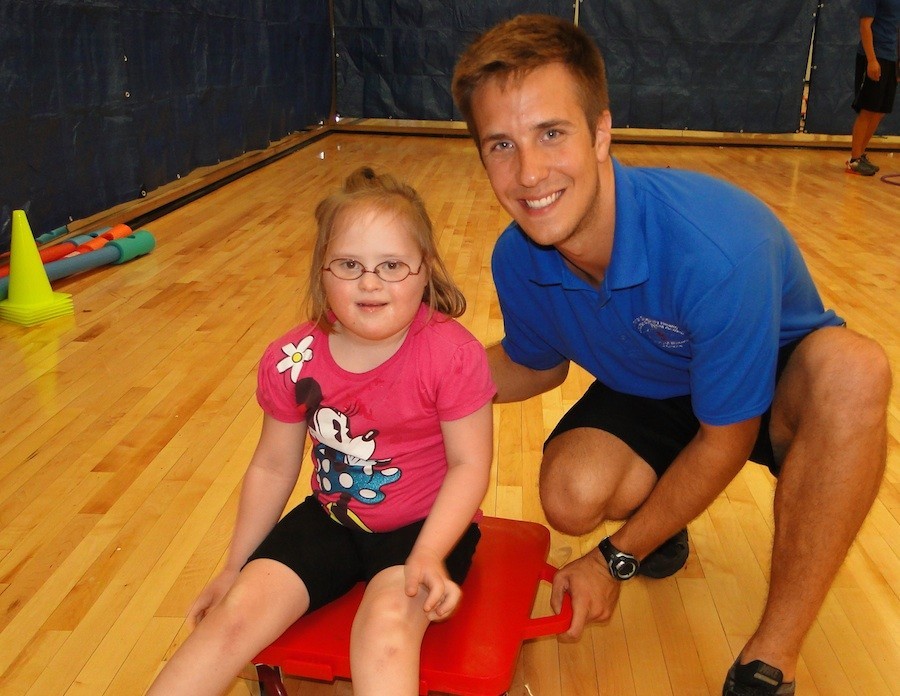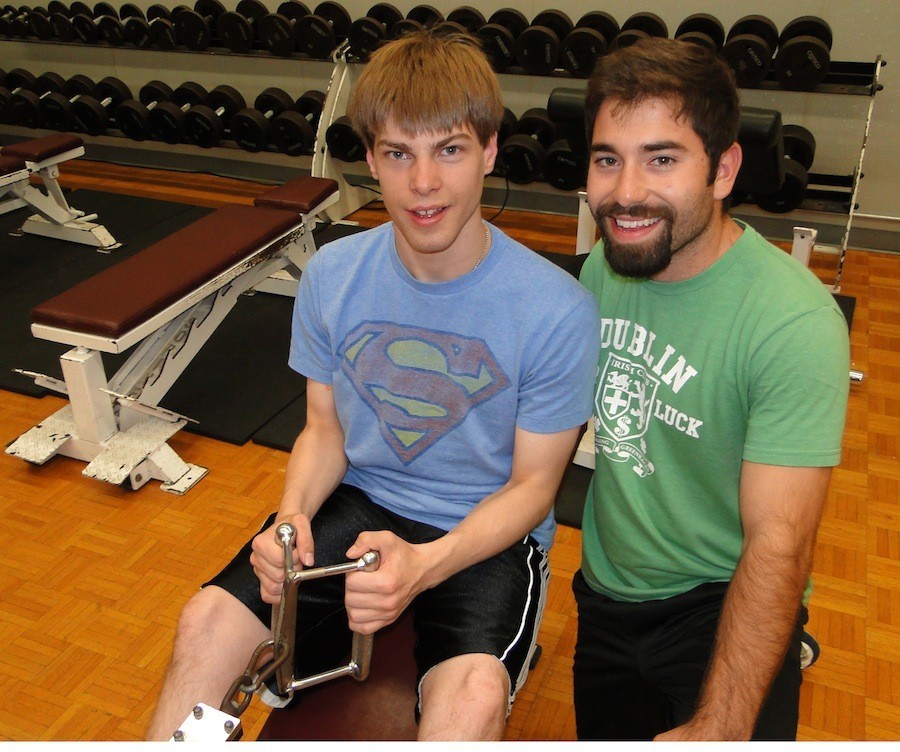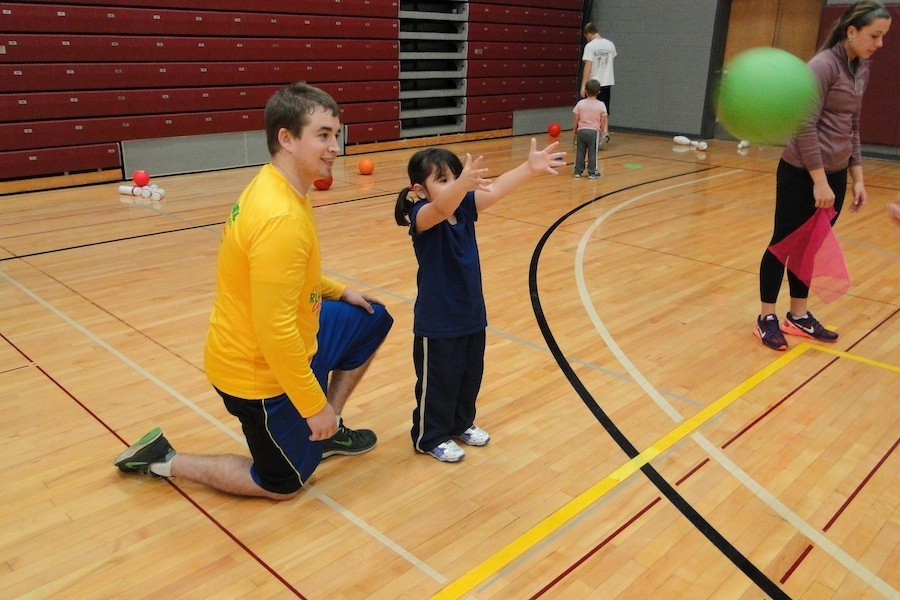
Physical Education for Students with Disabilities

The Individuals with Disabilities Act requires that students with disabilities receive physical education services, specially designed if necessary. If your child has a disability and an IEP, the school must provide physical education as part of your child's special education program.
Many students with disabilities can safely and successfully participate in general physical education, with or without accommodations and supports. However, some children benefit from specially designed or adapted physical education. Content in adapted physical education should mirror the general physical education curriculum to the greatest extent possible.
Because physical education is a required component of special education, your child's general and/or adapted physical education teacher should be included as a member of the IEP team if the student is receiving specially designed physical education.
At a minimum, if your child is receiving specially designed or adapted physical education, the IEP should include a summary of present level of performance in physical education content, the frequency and duration (minutes and days per week or stipulated time period) of physical education services, measurable goals and objectives about content, and the placement where these services are provided. Like all other special education and related services, physical education instruction should be detailed in the IEP.
Note: These required physical education services are different and separate from related services such as physical and occupational therapy. Best practice is a “motor team” approach or service delivery model where adapted and general physical education teachers and related service personnel work collaboratively to meet the unique needs of students with disabilities.
Physical Education Content and Requirements in IDEA
34 C.F.R.300.39(b)(2) IDEA defines "physical education" as the development of:
Physical and motor skills
Fundamental motor skills and patterns
Skills in aquatics, dance, and individual and group games and sports (including intramural and lifetime sports)
Includes special physical education, adapted physical education, movement education, and motor development
20 U.S.C. 1401(29) Special Education. The term 'special education' means specially designed instruction, at no cost to parents, to meet the unique needs of a child with a disability, including -
(A) instruction conducted in the classroom, in the home, in hospitals and institutions, and in other settings; and
(B) instruction in physical education.
34 CFR 300.108 Physical Education. The State must ensure that public agencies in the State comply with the following:
(a) General. Physical education services, specially designed if necessary, must be made available to every child with a disability receiving FAPE, unless the public agency enrolls children without disabilities and does not provide physical education to children without disabilities in the same grades. [See Commentary to IDEA below for more information on this often confused "grade level" misconception.]
(b) Regular physical education. Each child with a disability must be afforded the opportunity to participate in the regular physical education program available to nondisabled children unless -
(1) The child is enrolled full time in a separate facility; or
(2) The child needs specially designed physical education, as prescribed in the child's IEP.
(c) Special physical education. If specially designed physical education is prescribed in a child's IEP, the public agency responsible for the education of that child must provide the services directly or make arrangements for those services to be provided through other public or private programs.
(d) Education in separate facilities. The public agency responsible for the education of a child with a disability who is enrolled in a separate facility must ensure that the child receives appropriate physical education services in compliance with this section.
Interpretation of the PE Requirement by the U.S. Department of Education
Commentary to IDEA (page 46583) discusses when PE is required for students with disabilities beyond the grade level requirement of nondisabled peers.
Note: This is a very important clarification that is often not known or understood by school district personnel since it appears in the discussion section of the IDEA regulations in the Federal Register. You should bring this clarification to the attention of school officials if PE is being characterized as a grade level requirement based on what nondisabled peers receive.
1. Physical education must be made available equally to children with disabilities and children without disabilities.
2. If physical education is specially designed to meet the unique needs of a child with a disability and is set out in that child’s IEP, those services must be provided whether or not they are provided to other children in the agency.
From H. Rpt. No. 94–332, p. 9, (1975):
Special education as set forth in the Committee bill includes instruction in physical education, which is provided as a matter of course to all non-handicapped children enrolled in public elementary and secondary schools. The Committee is concerned that although these services are available to and required of all children in our school systems, they are often viewed as a luxury for handicapped children.
US Department of Education - Office of Special Education Programs: Policy Letters, Guidance, and Clarification
The following letters from the US Department of Education clarify some common misconceptions about PE services for students with disabilities.
The two letters below cover the age range of required PE services for students with disabilities (3-21 years). The preschool and high school transition ages are often overlooked. These periods are important times for motor development, health-related fitness, sport skills, aquatics, community-based physical activity, and many other content areas common in general and adapted physical education programs.
The next letter clarifies that other subjects or services cannot be substituted for or replace required PE.
The following Guidance Document provides information about extracurricular athletics or sports for students with disabilities. Section 300.107 of IDEA includes information on Nonacademic Services, including extracurricular athletics or sports. These services are a required part of special education.
The state must ensure the following: (a) Each public agency must take steps, including the provision of supplementary aids and services determined appropriate and necessary by the child’s IEP Team, to provide nonacademic and extracurricular services and activities in the same manner necessary to afford children with disabilities an equal opportunity for participation in those services and activities, (b) Nonacademic and extracurricular services and activities may include counseling services, athletics, transportation, health services, .
Schools’ Obligation to Provide Equal Opportunity to Students with Disabilities to Participate in Extracurricular Athletics, OCR Guidance Document, January 25, 2013.
Adapted Physical Education
Adapted or specially designed physical education (APE) is about meeting the unique needs of individual students with disabilities. In APE, the instructor provides planning and assessment, consultation for general physical education teachers, specially designed instruction, and adapts or modifies the curriculum, task, equipment, and/or environment so a child can participate in all aspects of physical education.

APE and general physical education teachers work together to design meaningful and beneficial instruction for all students.
APE Certification for Teachers
It is common for teachers to specialize or have advanced preparation in adapted physical education. National and state level adapted physical education teacher certifications or licenses exist.
Adapted Physical Education National Standards (APENS). The mission of APENS is to promote the 15 Adapted Physical Education Standards and national certification exam. The goal of APENS is to ensure that all students who qualify for specially designed physical education services receive them from a "qualified" teacher. Teachers who pass the APENS exam receive CAPE recognition (Certified Adapted Physical Educator).
Some individual states also have add-on teaching licenses or certifications in adapted physical education. The following states have separate teaching licenses in adapted physical education: CA, LA, ME, MI, MN, NE, OH, OR, RI, SD, WI, and WY.
Talk with your school district. Ask about teacher qualifications. Encourage your district to hire staff who are qualified to teach adapted or specially designed PE.
See the directory below for samples of many adapted physical education teacher preparation programs.
Preparing Qualified and Effective Adapted Physical Educators to Improve Outcomes for Students with Disabilities. Personnel development in adapted physical education can lead to meaningful student success and positive education outcomes. This Webinar from the National Center to Improve Recruitment and Retention of Qualified Personnel for Children with Disabilities highlights the roles & responsibilities and preparation of adapted physical education (APE) teachers.
Eligibility Criteria for Adapted Physical Education Services
Eligibility Criteria for Adapted Physical Education Services. Position statement (2018) from the national PE organization - SHAPE America. Many school districts and adapted PE teachers around the country use this for guidance.
A few states like MN and LA have developed state-approved adapted physical education eligibility criteria.
In most states, each school district has its own criteria for adapted or specially designed physical education eligibility.
New! IEP Checklist: Physical Education Services. Use this checklist to make sure the IEP Team fully addresses your child's physical education services and placement.
Physical Education and IEP Development. All of the IEP requirements make the physical educator more accountable for including students with disabilities in regular physical education whenever it is appropriate.
Why You Need to Ask "Dumb" Questions. I was so "dumb" that when my daughter was in first grade, her father or I went to school every day she was scheduled for physical education so we could remove her from activities that were contraindicated for her physical condition. I was so "dumb" I didn't know there was such a thing as adapted physical education.
Feeling Guilty About Asking For Special Ed Services? Remember the Domino Effect. A second issue in our hearing was whether my child required Adapted Physical Education (APE). At the time of our hearing in 1987, APE was not provided to any child in the entire county. The hearing officer ruled that my child did require adapted physical education. Since 1988, APE has been provided to hundreds of children in our county.
Court of Appeals for the Ninth Circuit Upholds Jury Award of One Million to Fired Special Ed Teacher by Peter Wright, Esq. & Pamela Wright, MA, MSW. Soon after she began work as an adaptive PE teacher, Dr. Settlegoode. was struck by inequities in access and services. Her students were not allowed to participate in activities that were freely available to non-disabled students. Many of these denials of access were in clear violation of law.
Schools Could Use Guidance on Physical Education for Disabled Kids by Christina Samuels. Students with disabilities get about the same time in physical education as their counterparts in general education, but teachers could benefit from sharing resources on how to keep kids with emotional or physical disabilities active, according to the 2010 GAO Report on Physical Education for Students with Disabilities.
Does an IEP make a child ineligible for sports? I was told that my child cannot participate in sports at school because he has an IEP. Isn’t this discrimination?
PE Central hosts a section on Frequently Asked Questions. Use the dropdown box and search function to find answers on any PE topic.
At Adapted PE FAQs, you can ask their Adapted PE Expert a question or scroll the previously answered questions on topics including:

Physical Education for Children with Disabilities. Minnesota PACER Parent Training and Information Sheet.
Physical Education Classes can be Adapted for Children with Disabilities by Beth Casper in the Early Childhood Connection Newsletter, Winter 2004, p.6.
"How to do it" Articles. A collection of practical articles that can be used by adapted and general physical education teachers, coaches, parents, and related service personnel from the Journal of Physical Education, Recreation, and Dance and other professional sources.
State Departments of Education - Adapted Physical Education Information for Parents and School Staff